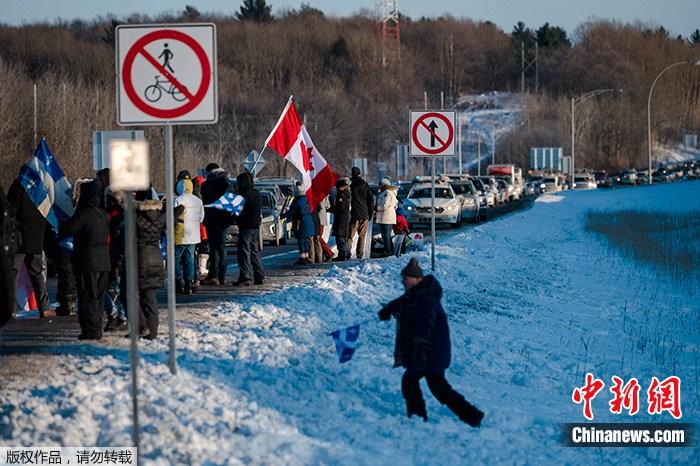China News Service, February 10th, a comprehensive report, from the blockade of the Capitol in Ottawa to the blockage of the border passage between the United States and Canada, the chaotic situation caused by the anti-epidemic demonstrations of Canadian truck drivers continues, and continues to spill over, even alarming the White House of the United States. .
U.S. President Biden worries that the blockade of the border passage between the two countries may affect the supply chain.
On January 29, local time, as many as thousands of people protested against the government's new crown restrictions in Ottawa, the capital of Canada.
Canada protests, White House panics
Since late January, demonstrations by a large number of truck drivers honking their horns to protest against mandatory vaccinations and other epidemic prevention measures have caused traffic jams in the Canadian capital Ottawa, chaos near the Parliament Building, the city has entered a state of emergency, and Prime Minister Trudeau has been forced to move to Safe place.
A few days ago, truck drivers expanded the "battlefield" from the capital to the US-Canada border.
The truckers initially protested because of opposition to legislation in Canada and the United States that would require vaccinating truckers crossing the border between the two countries.
Traffic into Canada was disrupted as drivers blocked the Ambassador Bridge connecting Detroit, Michigan, U.S., and Windsor, Ontario, Canada.
Another border crossing in Alberta, Canada, has also been closed in both directions since the evening of the 8th.
The Ambassador Bridge is a major artery for the transportation of Detroit automakers and agricultural products, accounting for about 25% of the trade volume between the United States and Canada.
Once this bridge is blocked, the United States "couldn't sit still."
White House spokesman Psaki said on the 9th that he supported free speech, but also warned that the blockade of the border could affect the supply chain and hurt the auto industry and agriculture.
"I think it's important for every Canadian and American to understand the impact (potential impact) on workers, on the supply chain, that's our biggest concern," Psaki said. .
Data map: US President Biden.
She also pointed out that U.S. President Biden is very concerned about this matter, and he is also in close contact with the Department of Homeland Security, Canadian officials and related industries to minimize the impact as much as possible.
"Global supply chains are already strained. Let's not make it worse." Bank of Canada Governor Macklem also called for a quick resolution.
Dozens arrested in New Zealand over protest spillover
The protests of truck drivers in Canada have also continued to spill over to other countries, triggering a demonstration effect in many countries.
Because many countries have implemented anti-epidemic restrictions for nearly two years, as the outbreak of the Omicron mutated virus begins to ease, the public's sense of fatigue on anti-epidemic measures has increased.
Australia, New Zealand and France have followed Canada's lead in protests.
On January 29, local time, as many as thousands of people protested against the government's new crown restrictions in Ottawa, the capital of Canada.
Hundreds of New Zealand residents have staged a "freedom motorcade" demonstration in the capital Wellington to protest the government's mandatory COVID-19 vaccination order.
New Zealand police began to disperse demonstrators gathered outside parliament on the morning of the 10th. Physical clashes broke out between the two sides and dozens of people were arrested.
Protests in Canberra, Australia, have been going on for several days and are expected to continue at least until the weekend.
Lawmakers in the country expressed concern that anti-vaccine protests could escalate.
In the United States, truckers are also seeking to join the protests, with thousands taking to social media to pledge to demonstrate in Washington, D.C., next month.

